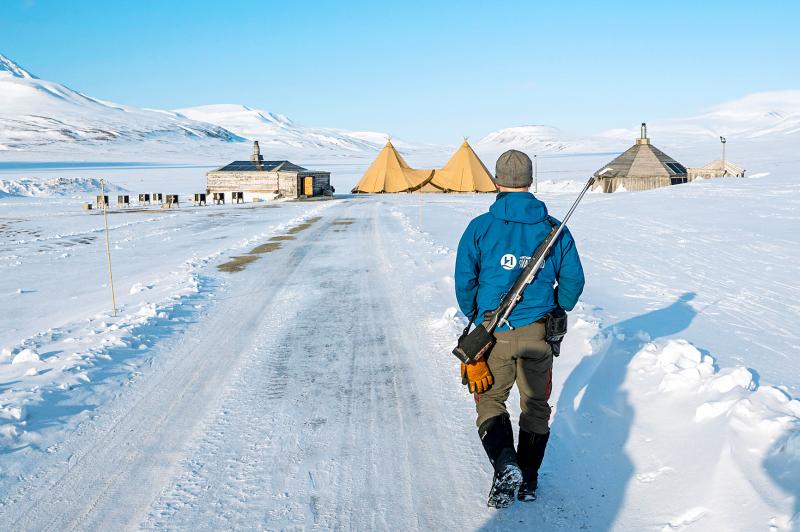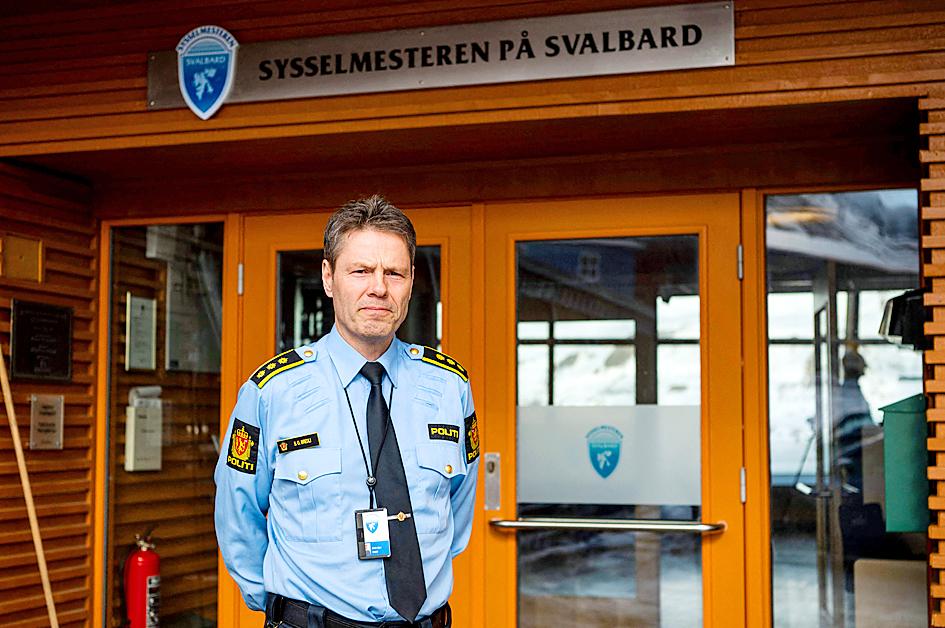With its ghost towns and armed men taking on a vast wilderness, one could almost mistake the Svalbard archipelago for the Wild West.
However, a tiny police force on these arctic islands halfway between Norway and the North Pole keeps outlaws — and polar bear botherers — at bay. Its 12 officers dash around on snowmobiles, in helicopters or on boats keeping the peace among the 3,000 hardy souls tough enough to endure the endless winter nights.
“Obviously most cases are pretty trivial,” Svalbard Police Chief Superintendent Stein Olav Bredli said from his office in the main town of Longyearbyen, with its stunning view of the fjord outside.

Photo: AFP
However, Svalbard’s criminal code has its own local peculiarities, such as disturbing a polar bear or boats breaking sea ice. The law takes a dim view of either, with a fine of 1,500 euros (US$1,558) for bothering a bear.
Bredli’s bread and butter are petty thefts, snowmobile accidents, occasional locals caught with drugs and anti-drunk driving campaigns.
The most common crime was once said to be shoe stealing — either intentionally or accidentally after one drink too many — because everyone removes their shoes when stepping indoors, even into a public building.

Photo: AFP
The crime section of the local newspaper Svalbardposten — like almost everything else here, the northernmost in the world — is pretty thin.
“A few brawls after the bars close” is about as much as editor Borre Haugli can hope for.
And yet Svalbard’s residents are armed to the teeth. It is mandatory to carry a rifle when leaving urban areas in case of a close encounter with a polar bear. Since 1971, six people have been killed by polar bears.
Haugli can only recall a single vehicle theft in his two years as the paper’s chief.
“It was probably drunk people who, after a party, saw a car with the keys inside,” he said.
Locals usually leave their homes and vehicles unlocked.
It helps when you have to make a quick getaway from a polar bear — and it is also a sign of the trust required to survive in such a hostile environment.
Besides, where can a thief run to when there are only 40km of roads and the only connection with the outside world — beyond a very long boat journey — is the small airport on the outskirts of Longyearbyen?
However, none of that stopped a Russian from committing the world’s northernmost bank robbery.
Maksim Popov in 2018 made off with 70,000 kroner (US$7,041 at the current exchange rate) after holding up the island’s only bank with a gun before he was swiftly arrested.
He was sentenced to more than a year in prison on the mainland.
The bank has since closed.
Bredli always locks his front door, he said, adding: “Occupational hazard.”
However, until he gave reporters a tour of his station, Bredli said he had never seen its single jail cell.
Clearly, it is rarely used.
“That would require a police officer to permanently guard it,” Bredli said, adding that his small unit cannot afford such a luxury.
Beyond the 130 complaints they investigate each year, Bredli’s officers spend most of their time on 24-hour standby for search-and-rescue missions.
With two helicopters at their disposal, they do it all, from helping boats in trouble at sea to finding tourists lost in the mountains.
“Imagine if a cruise ship were to sink. It’s not easy to evacuate 1,000 passengers,” Bredli said.
“It’s one thing to bring the passengers ashore in what would certainly be difficult weather conditions,” but police would also have to “make sure they are safe from the threat of polar bears,” he added.

Kehinde Sanni spends his days smoothing out dents and repainting scratched bumpers in a modest autobody shop in Lagos. He has never left Nigeria, yet he speaks glowingly of Burkina Faso military leader Ibrahim Traore. “Nigeria needs someone like Ibrahim Traore of Burkina Faso. He is doing well for his country,” Sanni said. His admiration is shaped by a steady stream of viral videos, memes and social media posts — many misleading or outright false — portraying Traore as a fearless reformer who defied Western powers and reclaimed his country’s dignity. The Burkinabe strongman swept into power following a coup in September 2022

‘FRAGMENTING’: British politics have for a long time been dominated by the Labor Party and the Tories, but polls suggest that Reform now poses a significant challenge Hard-right upstarts Reform UK snatched a parliamentary seat from British Prime Minister Keir Starmer’s Labor Party yesterday in local elections that dealt a blow to the UK’s two establishment parties. Reform, led by anti-immigrant firebrand Nigel Farage, won the by-election in Runcorn and Helsby in northwest England by just six votes, as it picked up gains in other localities, including one mayoralty. The group’s strong showing continues momentum it built up at last year’s general election and appears to confirm a trend that the UK is entering an era of multi-party politics. “For the movement, for the party it’s a very, very big

ENTERTAINMENT: Rio officials have a history of organizing massive concerts on Copacabana Beach, with Madonna’s show drawing about 1.6 million fans last year Lady Gaga on Saturday night gave a free concert in front of 2 million fans who poured onto Copacabana Beach in Rio de Janeiro for the biggest show of her career. “Tonight, we’re making history... Thank you for making history with me,” Lady Gaga told a screaming crowd. The Mother Monster, as she is known, started the show at about 10:10pm local time with her 2011 song Bloody Mary. Cries of joy rose from the tightly packed fans who sang and danced shoulder-to-shoulder on the vast stretch of sand. Concert organizers said 2.1 million people attended the show. Lady Gaga

SUPPORT: The Australian prime minister promised to back Kyiv against Russia’s invasion, saying: ‘That’s my government’s position. It was yesterday. It still is’ Left-leaning Australian Prime Minister Anthony Albanese yesterday basked in his landslide election win, promising a “disciplined, orderly” government to confront cost-of-living pain and tariff turmoil. People clapped as the 62-year-old and his fiancee, Jodie Haydon, who visited his old inner Sydney haunt, Cafe Italia, surrounded by a crowd of jostling photographers and journalists. Albanese’s Labor Party is on course to win at least 83 seats in the 150-member parliament, partial results showed. Opposition leader Peter Dutton’s conservative Liberal-National coalition had just 38 seats, and other parties 12. Another 17 seats were still in doubt. “We will be a disciplined, orderly